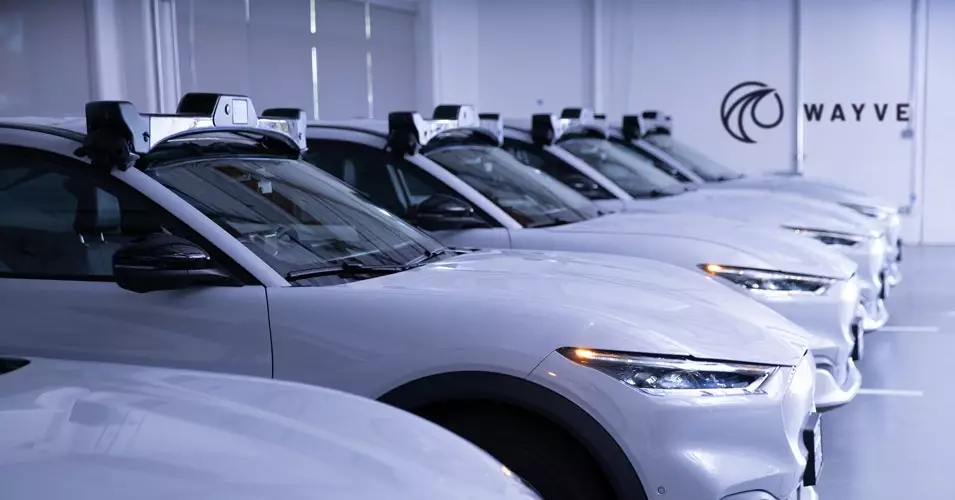As the automotive industry continues to evolve, the excitement surrounding autonomous vehicles (AVs) resurges, propelled by significant investments and innovative approaches. Among the notable players in this field is Wayve, a start-up that has recently emerged from the shadows to become a beacon of hope in the self-driving race. Founded in 2017, Wayve’s journey exemplifies the resilience and ingenuity required to thrive amid the challenges of developing reliable autonomous technology. Today, the company has expanded to include nearly 450 employees across its U.S. hub in Sunnyvale, California, and its growing base in London, with serious funding backing its ambitious vision.
Challenges and Setbacks in the Autonomous Vehicle Race
For years, the promise of self-driving cars has sparked imagination and anticipation, often overshadowing the hard realities of technological limitations. Major players like Apple, Uber, and Volkswagen have pulled back from their autonomous programs, admitting the complexity of achieving true autonomy. This situation reflects a broader trend in the tech sector, where many companies have experienced what is known as the “trough of disillusionment,” characterized by a stark realization that hype must be matched by tangible application.
Yet, as the industry grapples with these hurdles, an undercurrent of renewed optimism is rising. Companies like Waymo are leading the charge, providing thousands of driverless rides weekly across major cities such as San Francisco and Los Angeles. Aurora is making strides in autonomous trucking, while Tesla introduces its futuristic Cybercab, albeit without fleshing out the details that enthusiasts crave. These developments signal a shift towards real-world implementation, suggesting that the light at the end of the tunnel for autonomous technology is brighter than ever before.
What distinguishes Wayve from its competitors is its commitment to a purely AI-focused methodology. As articulated by co-founder Alex Kendall, the prevailing thought among industry titans has been to regard self-driving as a problem of infrastructure and robotics, requiring significant hand-coding and cumbersome mapping techniques. In stark contrast, Wayve envisions leveraging cutting-edge AI to facilitate a more scalable and adaptable approach to vehicle autonomy.
Kendall’s thought leadership too plays a crucial role in Wayve’s distinct identity. With a vision that echoes the relentless drive of early tech innovators like Elon Musk, Kendall is dedicated to diving deep into the complexities of autonomous technology while staying grounded in the realities of existing infrastructure. This commitment may prove essential as Wayve seeks to carve out a niche in a saturated market where larger players may struggle to pivot from outdated methodologies.
Recent funding, notably from Softbank and other prominent investors, has given Wayve the necessary resources to pursue their vision aggressively. This financial backing facilitates not just growth in personnel but the establishment of crucial testing facilities, enabling advancement in operational capabilities. Wayve’s strategic focus on artificial intelligence can potentially accelerate its development cycle, allowing for a faster rollout in urban settings.
Moreover, the decision to base operations in both the U.K. and the U.S. positions Wayve advantageously in two robust automotive markets, catering to diverse regulatory environments and consumer landscapes. This international presence will allow Wayve to test and adapt its models effectively, gathering a variety of data to optimize its systems for real-world challenges.
As Wayve embarks on this promising chapter, the road ahead undoubtedly remains fraught with challenges. Competing against well-funded and established rivals may prove difficult, especially as more advanced AI and data processing capabilities are developed. Nevertheless, the company’s commitment to a unique, scalable approach to autonomy, combined with Kendall’s visionary leadership, could position it to succeed where others have faltered.
As the world begins to embrace this new era of transportation, the unfolding narrative of autonomous vehicles continues to captivate. With companies like Wayve leading the way through uncharted territory, the dream of intelligent machines on our roads may no longer be relegated to the realm of fantasy but could soon become a startling reality. Only time will tell if Wayve’s approach will illuminate the path toward a genuinely autonomous future—a future defined not just by technology, but by the visionaries bold enough to pursue it.

